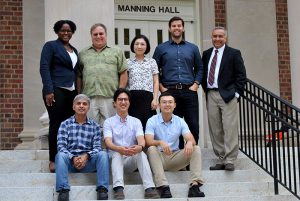The Carolina Health Informatics Program (CHIP) recently celebrated a significant milestone as Terika McCall became the first student to graduate with her Doctor of Philosophy in Health Informatics.
CHIP launched its PhD program in the fall of 2016. Just one year later, the National Institutes of Health – National Library of Medicine awarded T15 Biomedical Informatics and Data Science Training Grant to CHIP Director and Professor Javed Mostafa. The highly competitive award provides financial support and training opportunities for CHIP’s PhD students, as well as funding for post-doctoral researchers.
McCall, a member of the initial T15 cohort, said she chose the CHIP program because its interdisciplinary nature offered her the chance to combine her interests in public health, technology, and business. She had previously earned a Master of Business Administration from Wake Forest University and a Master of Public Health from the University of Michigan.
“I felt that it would be a great place for me to grow as a researcher,” she said. “I remember sharing my research interests with Dr. Mostafa and he was completely supportive. That made me feel comfortable with my decision.”
McCall’s dissertation examines the attitudes and perceptions of African American women towards using mental health services, and the feasibility of using mobile technology to deliver those services and other resources to help manage anxiety and depression. She also worked to develop and conduct usability testing of a prototype mental health mobile app tailored to help African American women manage anxiety and depression.
McCall said she first became interested in the use of mobile health (mHealth) interventions in 2016 when she visited a hospital in China.
“I learned that they were using a popular app to conduct telemedicine visits with patients in remote areas,” she said. “After having a meeting with my advisor, I was certain that I wanted to focus on mHealth and mental health because there is a great need that I believe access to telemental health services can help meet.”
Saif Khairat, McCall’s dissertation advisor and an assistant professor with CHIP and the UNC School of Nursing, said McCall’s research focus was especially critical from a health equity perspective.
“African American women have yet to receive adequate digital mental health care, and this is what she has been working for,” Khairat said. “Her work will help bring attention to an area of research in clinical medicine that is yet to be fully explored.”
McCall, who will soon start a postdoctoral research fellowship in biomedical informatics and data science at Yale University, said she plans to continue working to find ways to use technology to reduce health disparities in underserved communities.
“I would like to launch a health tech startup that is focused on making health care more accessible and affordable,” she said. “I am a big advocate for mHealth interventions because I believe the best solutions incorporate technology that patients can already access and need minimal education on how to use.”
McCall said her time at CHIP was greatly enhanced by attending conferences, such as the American Medical Informatics Association (AMIA) conference and the National Library of Medicine (NLM) training conference, with other CHIP PhD students.
“I had the opportunity to present my research, learn about interesting research that is happening in our field, network, and build comradery with my cohort members,” she said.
McCall said she also appreciated the guidance she received from Khairat and her dissertation committee members, Javed Mostafa, Todd Schwartz, and Fei Yu from UNC and Paul Fontelo from the NLM, as well as the support of the CHIP administrative staff, particularly CHIP PhD Program Coordinator Lindsey Womack.
Womack said McCall’s passion, drive, and positive attitude made working with her a joy.
“The pace she set in her research inspired the program to grow and stretch to meet her needs as a student,” Womack said. “As our first graduating doctoral student, she helped shaped the PhD program at CHIP and we are better for it!”
----
CHIP is currently recruiting PhD students for the spring 2021 semester. Qualified applicants can receive support through the National Library of Medicine Bioinformatics and Data Science Research Training Grant Fellowship Program.
Current health informatics PhD students are pursuing research in computational drug repurposing, self-medication management through chatbots, identifying social determinants of health via electronic health records, developing a biomedical use-case library, and machine learning to advance medical adherence.
A truly interdisciplinary program, CHIP draws faculty and expertise from the UNC School of Information and Library Science (SILS), UNC School of Medicine, Gillings School of Global Pubic Health, UNC School of Nursing, Eshelman School of Pharmacy, UNC School of Dentistry, and Computer Science Department.
[columns] [span6]

[/span6][span6]

[/span6][/columns]
Written by Katherine Pearl Perales, Communications Coordinator at UNC School of Information and Library Science (SILS), kpearl@email.unc.edu

